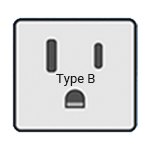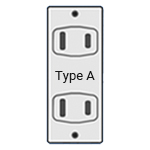The first impression of Japan is that it is somewhat cluttered, but well-organised, clean and unique. In addition, the food in Japan is fresh and delicious, and there is a wide variety of drinks and foods to enjoy, including tea, sake and ramen. It is also believed that Japanese people are friendly and polite. There are many traditional cultural activities that you can try out during your stay, providing a colorful experience for tourists.

1. Japan Quick Facts
Language Japanese
Religion Buddhism & Shinto
Currency Japanese Yen (JPY)
Visa Free 90 day visa for many countries


Power Plugs 120 V 50 Hz 60 Hz (Type A / B)
Capital Tokyo
ATM
Conveniently used in Japan, you can withdraw cash at the Japan Post Office’s Japan Post Bank ATM and the SEVEN BANK ATM at the convenience store 7-Eleven.
Use card JCB, VISA, and MASTER are popular, but use of other cards may be restricted.
Useful APP
Google Maps
Japan Connected-free Wi-Fi : App for foreigners visiting Japan to easily connect to free Wi-Fi throughout Japan
Japan Travel Guide for tourists : Japan Travel by “NAVITIME” will help you travel around like a local!
2. Packing for your trip
Air plain Ticket
Dollar Flight Club has made it easier and cheaper to buy flights to the Airport.
SIM card
Airalo is the world’s first eSIM store that solves the pain of high roaming bills by giving you access to 200+ eSIMs (digital SIM cards) globally at affordable prices.
New member one-time use 15% discount coupon
10% discount coupon for multiple use by all members.
Tokyo luggage storage and delivery services
Pacsafe Pro safe 800 Luggage Lock
Good protection against snatchers or impulse thieves.
Universal Power Adapter
One of the most essential but most forgotten items in your travel gear? A power adapter!
Travel insurance
Prepare for risky situations Travel insurance can be a big help in the event of an emergency
GoPro HERO
If you want to capture your own memories of your travels, GoPro is the way to go. It’s small, has great image quality, and is easy to carry around
3. Transportation
Rent a Car : The islands of Hokkaido and Okinawa are much easier to get around by car, with a good road network.
Taxi : Taxi fare is really expensive
Initial fare (base fare): 500 yen up to ~1.096 km and additional fare (distance fare): 100 yen per 255 meters. Late night and early morning surcharges: 20% from 22:00 to 5:00
Combined time-distance fare: 100 yen for every 1 minute and 35 seconds under 10 km/h
The Japan Rail Pass , jointly offered by six JR Group companies, is a convenient and economical ticket suitable for train travel throughout Japan. For more information, please visit the official website. Although this all-encompassing pass is the right choice for many, consider some of the regional alternatives below for more of a bargain.
JR Metro
Tokyo has a well-developed subway and railroad system, so you can visit almost any tourist attraction in Tokyo by subway. You may need to make several transfers between rail lines, but you can easily find the route using Google Maps.
Buses are also easy to use and arrive at almost the exact time. You’ll need to buy a ticket when you board a bus or subway, but you can use the Suica, PASMO PASSPORT card, a transportation card, to use the bus and subway with ease.
Tip : How to use the Bus
There are two types of buses in Japan. For one of them, you will enter from the back, and it is a numbered ticket system instead of a flat rate system. You will exit from the front and pay your fare at the front that will differ depending on where you get on and off. On the other type of bus, you will enter from the front and pay a flat rate when you get on.
Not all buses accept IC cards, so be sure to check for the IC symbol at the bus stop or at the entrance of the bus when getting on. If there is no IC symbol, you will need to pay in cash. Luckily, most buses have easy-to-use exchange machines. If you plan on paying in cash, take a numbered ticket from the box when you get on the bus.(if it is a non-flat rate fare system). When you are approaching your stop, check the screen at the front of the bus and find your number along with the corresponding fare. As you get off the bus, put the exact fare in the machine at the front of the bus. If you put in more than your exact fare, you will not get any change back. However, if it is a flat rate system, when you get on at the front of the bus, even if you pay over, you will get change back in most cases.
In the case that you use your IC card, tap it once when you get on the bus, and tap it again when you get off the bus.
4. Safety
Japan is a very safe country and has a very low crime rate. If your passport is stolen, lost, involved in a car accident or other incident and you need to replace it or collect insurance money, you’ll need to report it to the police and fill out an investigation form. The police station will fill out this paperwork for you. You can also ask the front desk of your hotel for help.
Useful phone numbers for tourists
Ambulance/fire truck phone number: 119
Police phone number: 110
Coast Guard phone number: 118
Metropolitan Police Department General Counseling Center (Tokyo English available)
Telephone: 03 3501 0110 (Weekdays 08:30 – 17:15)
5. Climate
Japan’s land area stretches from the northernmost island of Hokkaido, close to Russia, to the subtropics of Okinawa. The weather varies greatly from region to region, so check the weather forecast for the areas you’ll be traveling to.
Spring (March to May): Temperatures begin to rise in spring and although it is generally warmer, it can still be chilly in some areas.
Summer (June to August): Summer in Japan is characterized by hot and humid conditions. Temperatures and humidity rise, and especially hot and humid weather can persist in July and August.
Fall (September to November): In fall, temperatures become comfortable again, and fall foliage creates beautiful scenery. September is still warm and it gradually gets colder in November.
Winter (December to February): Temperatures drop significantly in winter, and snow may fall in some areas. January and February are particularly prone to prolonged cold spells.
6. price
ourist prices in Japan can vary depending on many factors. Prices are mainly influenced by city, season, length of trip, and accommodation options. In general, big cities like Tokyo and Osaka can have higher costs than other regions.
For tourists, the weaker yen has lowered the perceived cost of living significantly.
McDonald’s Combo Meal: 650-850 yen
Convenience store bento box: 350-600 yen
7. Travel precautions
These days, card use is common, but please note that many markets, local restaurants, and taxis only accept cash.
Restroom is available for free.
Tax : Some major tourist destinations are offering TAX FREE.
Some stores may display prices excluding taxes, so you need to pay attention to whether the displayed price includes taxes or excludes taxes.
8. Etiquette & Service Tip
It is best to avoid talking on the phone in the subway. When eating with Japanese people, politely say ‘Itadakimasu (I will eat well)’ before eating.
Taxi doors are opened automatically by the driver, so it’s rude to open them yourself.
In a restaurant, don’t sit down because there’s an empty seat; wait to be seated.
No service charge No tip
9. Holidays
The public holidays in Japan in 2024 are as follows:
January 1 (Monday) – New Year’s Day
January 8th (Monday) – Coming of Age Day
February 12 (Monday) – National Foundation Day
February 23 (Friday) – Emperor’s Birthday
March 20 (Wednesday) – Vernal Equinox Day
April 29 (Monday) – Showa Day
Friday, May 3 – International Labor Day (Constitution Memorial Day)
Saturday, May 4 – Greenery Day
Sunday, May 5 – Children’s Day
The substitute holiday for May 6 occurs when Children’s Day
Monday, July 15 – Marine Day
August 11th (Sunday) – Mountain Day
The substitute holiday for August 12 occurs when Mountain Day
September 16 (Monday) – Respect for the Aged Day
September 22(Sunday) – Autumn Equinox Day
The substitute holiday for September 23 occurs when Children’s Day
October 14 (Monday) – Health and Sports Day
November 3 (Sunday) – Culture Day
Saturday, November 23 – Labor Thanksgiving Day
2025 National Public Holidays:
Wednesday, 1 January : New Year’s Day
Monday, 13 January : Coming of Age Day
Tuesday, 11 February : National Foundation Day
Sunday, 23 February : The Emperor’s Birthday
Monday, 24 February : The Emperor’s Birthday Holiday
Thursday, 20 March : Vernal Equinox Day
Tuesday, 29 April : Shōwa Day
Saturday, 3 May : Constitution Memorial Day
Sunday, 4 May : Greenery Day
Monday, 5 May : Children’s Day
Tuesday, 6 May : Greenery Day Holiday
Monday, 21 July : Marine Day
Monday, 11 August : Mountain Day
Monday, 15 September : Respect for the Aged Day
Tuesday, 23 September : Autumnal Equinox Day
Monday, 13 October : Health and Sports Day
Monday, 3 November : Culture Day
Sunday, 23 November : Labour Thanksgiving Day
Monday, 24 November : Labour Thanksgiving Day Holiday